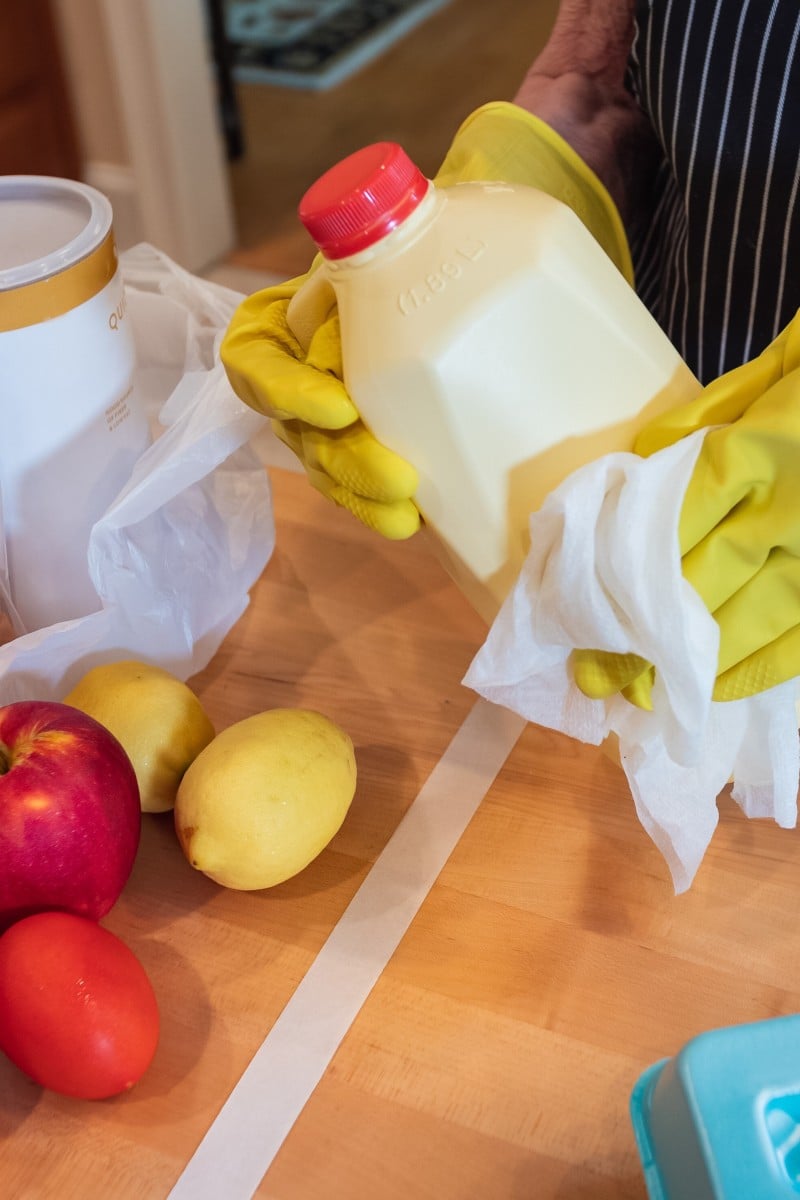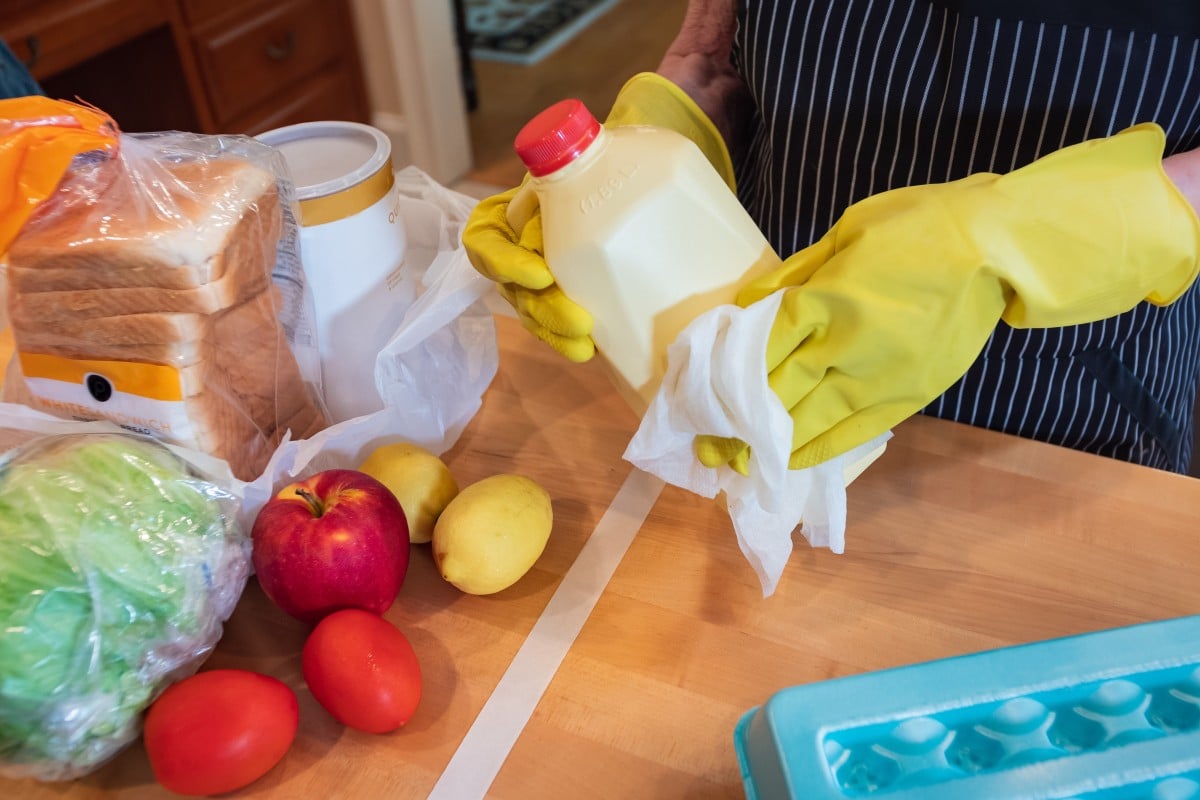
Coronavirus: Should I use disinfectant wipes on groceries, mail and everything I bring into my home?
- The key to protection against Covid-19 is not cleaning every Amazon package, but washing your hands
- The one surface you should consistently clean is your mobile phone
 How clean is clean enough?
How clean is clean enough?At the start of the Covid-19 pandemic, some people advised disinfecting every item that came into your home: food from the supermarket, parcels from Amazon or Taobao, takeaway food containers. Clorox, the world’s biggest maker of disinfectant cleaning materials, says it’s still recovering from high demand of its popular disinfectant wipes, not expected to return to shelves until 2021.
In the beginning, we were all encouraged to take every precaution that we could. But do we still need to sanitise everything in sight?
With months of research now behind us, experts say the answer is probably not. Yet, that doesn’t mean surfaces present zero risk. Here’s how to approach things now.
Wash your hands, not your packages
By now, we know that the virus is thought to spread mainly from person-to-person. And experts agree that your time is better spent washing your hands after you return from the supermarket than wiping down every item brought home.
Why? “While it’s theoretically possible that there’s fomite-related transmission – transmission through contaminated surfaces – we’re not seeing any cases reported that are directly linked to that,” says Patricia Henwood, associate professor of emergency medicine at Thomas Jefferson University’s Sidney Kimmel Medical College in Philadelphia, in the US, and leader of the Emergency Medicine Covid-19 Task Force at Jefferson Health.
Research suggests Covid-19 on chilled salmon could be infectious for a week or more
“Where people need to focus their energy on is hand-washing, masking and distancing,” says Henwood.
When you’re done putting your shopping away, wash your hands again. And then apply that same mindset as you move throughout your life. When you touch something outside your home, wash your hands or use hand sanitizer immediately after. It’s more effective, and more important, than later wiping down things you touched after. Experts say the likelihood of getting the coronavirus from a delivery box is low.
11 handwashing songs that aren’t Happy Birthday to make sure you get in 20 seconds of cleaning
And always, always remember to wash your hands before eating. If your hands are contaminated and you touch your face, you could get sick.
“There are only so many surfaces you can remember to sanitise anyway,” says Thersa Sweet, associate teaching professor of epidemiology and biostatistics at Drexel University.
But “if you’ve touched something that has the virus on it, and you wash your hands, the virus is gone.”
Risk of surface transmission is considered low, but that doesn’t mean zero risk
The Centres for Disease Control and Prevention says that while it’s possible you can get the coronavirus by touching a surface that has the virus on it and then touching your face, “it’s not thought to be the main way the virus spreads.” But that doesn’t mean the risk is zero.
The virus could be on any surface; the best way to prevent illness is to wash your hands.“I don’t want people to completely disregard the fact that the virus can be on surfaces,” says Sweet. “Imagine someone coughs into their hand, they touch a doorknob, and you come by two minutes later and touch the same doorknob, and then wipe your nose. You could become infected.”
Hand-washing, and paying attention to what you touch, are still both important.
“Though the risk of surfaces causing transmission is low, you still want to be aware,” says Dr Eric Sachinwalla, medical director of Infection Prevention and Control at Einstein Medical Centre Philadelphia.
“And there are other illnesses where it could be more of a concern, especially with flu season coming up.”
What’s worth wiping down
Experts say it’s a good idea to regularly wipe down your mobile phone. And if someone else borrows it, then you definitely should.
“It’s like when you wear a cloth mask to the grocery store, and you wash it before using it again because there could be virus particles on the outside – your phone could be the same way, particularly because it’s up against your face,” says Sweet.
You may also want to disinfect your doorknobs, especially if you share an entrance with others outside of your household. And if you’re returning to an office or sharing equipment, elevate your cleaning efforts.
But again, the surface you need to be most concerned about is the one on your hands.
If someone in your home gets sick, return to high alert
Step up your cleaning game if someone in your household was, or may have been, exposed to Covid-19. This includes if they aren’t experiencing symptoms but are awaiting test results.
The coronavirus symptoms you might not know about
In the event someone tests positive or gets sick, try to minimise their contact with shared surfaces. Keep them in one room, if possible, and avoid sharing a bathroom if you have a spare.
“Be more aggressive with cleaning, especially in areas where the sick person is living,” says Sachinwalla.
“Once they start feeling a little better, wash their sheets and towels regularly – you don’t have to throw them away, just wash them. And then make sure you’re wiping any horizontal surfaces where droplets could have spread.”
Just like in a hospital, everything should be regularly wiped down in any high-risk setting.
You can stop wiping down your credit card (but doing it wasn’t wrong)
Coronavirus advice is ever-evolving. While it may have felt a little ridiculous to sanitise your credit card after every public transaction, you don’t have to feel silly for having done so. And health experts were never trying to trick you.
“This is a novel area of science, and of course at the beginning when we know less, we want to take as much precaution as possible,” says Henwood. “We’re trying to learn as much as we can, as fast as we can, and when we have more data, that’s what leads us to change our guidance. That will continue to happen as we have more data and testing.”